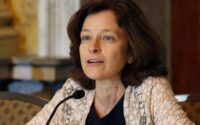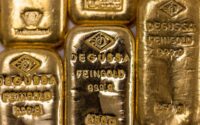Bond King Bill Gross: U.S. will enter recession in Q4
Even some of the biggest bond bears on Wall Street fear they have flown too close to the sun, saying the market rout on Treasury bonds has pushed too far.
First, billionaire investor Bill Ackman, founder of Pershing Square Capital Management, wrote, “There is too much risk in the world to remain short bonds at current long-term rates,” and now the “Bond King” himself, Bill Gross, has chimed in to suggest investors should buy bonds.
Gross, former chief investment officer of Pacific Investment Management Co., or Pimco, urged his followers on X—the social media platform formerly known as Twitter—to “invest in the curve” on bonds, which have been hit with a selloff in recent months.
Yields on 10-year government bonds peaked at more than 5% last week‚ the first time in 16 years, while 30-year bonds similarly spiked at approximately 5.2%.
When Treasury bond yields rise, Treasury bond prices fall. This is why investors like Ackman have been shorting, or betting against, bond prices.
While some spectators expect to see yields—boosted by a high base rate and an expectation that bond supply will increase—fly to more than 6% in certain time frames, Gross and Ackman are convinced now is the time to scale back their bets on yields rising further.
“’Higher for longer’ is yesterday’s mantra,” Gross wrote.
Thus far, many on Wall Street had hoped the Fed would pull off a so-called soft landing of slow growth but not necessarily a recession.
Gross revealed he now disagrees, countering: “Regional bank carnage and recent rise in auto delinquencies to long-term historical highs indicate U.S. economy slowing significantly.”
“Recession in fourth quarter,” he added.
Maybe next week. Will tweet.
On bonds. Invest in the curve. Various combinations 2/10, 2/5. Should go positive before year end. I’m buying SFR h5 (SOFR futures). “Higher for longer” is yesterday’s mantra. 2/2— Bill Gross (@real_bill_gross) October 23, 2023
The Fed isn’t too worried about yields
For all the headaches Treasury yields are causing Ackman and Gross, the yield spike has actually done some of the work for the Fed, chairman Jerome Powell has said.
During a meeting with the Economic Club of New York, Powell seemingly echoed some of the sentiments of his Fed colleagues who believe the rise in yields is helping tighten financial outlooks.
As a result of the headwinds, Powell told his audience that “at the margin” the friction might lessen the need for additional Fed rate increases in the future.
It’s an opinion echoed by professor Jeremy Siegel, of the Wharton School at the University of Pennsylvania, who is convinced the Fed will not hike rates again on Nov. 1 precisely because of the bond market.
“Concerns about rates staying higher for much longer are keeping long yields ticking higher. I do think the recent high inflation that we’ve experienced is raising the premiums and compensation demanded to own bonds,” professor Siegel wrote in his weekly Wisdom Tree commentary.
Like Ackman and Gross, Siegel advised a long-term approach, warning the current upset is not a “short-term phenomenon.”
He added: “The higher long-end rates are tightening conditions without the Fed raising short-term rates. It seems Powell has been very successful at getting unanimity and no dissent, and the chorus from recent Fed officials hinted for another pause.”
Indeed, professor Siegel believes that the bond market is not only to thank for a switch from hikes to a pause, but for shifting the Fed into “permanent pause mode.”
[ad_2]
Source link

